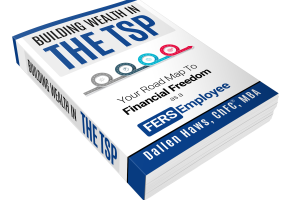Is your goal for a federal retirement to maintain your current standard of living? What is it going to take to do that? Today, we’ll be talking about your FERS retirement benefits and whether they are enough for your comfort level.
Net vs Net
Most people have a goal of replicating what they take home now in retirement. The first step in planning for this is to compare the net income you receive now vs the net income you will receive in retirement. Right now, there’s a lot of things that get deducted from your paychecks every two weeks like FEGLI (life insurance), FEHB (health insurance), saving into the TSP, taxes, dental/vision, etc. After all these deductions, you get your net pay. This can be found on your LES (leave and earnings statement).
Now, we want to change your net pay to a monthly number. You can do this by multiplying it by 26 (the number of pay periods every year) and divide it by 12 (the number of months per year).
Example:
Net Pay = $2,000
$2,000 x 26 = $52,000
$52,000/12 = $4,333
So, your net pay per month is $4,333
Now, let’s estimate how much net retirement income you will have each month. There are three main sources of income in retirement: FERS pension, Social Security, and your TSP (Thrift Savings Plan).
The FERS pension is similar to your paycheck in that you will have all the deductions such as taxes, insurance premiums, etc. You also need to consider if you will have the 5% or 10% survivor benefit to your pension. Here are some great articles/videos on how to calculate your net pension in retirement. Let’s say your net pension after deductions is $1,500. And let’s assume you have a social security benefit of $1,500 when you retire. Finally, let’s assume you have $500,000 in the TSP and use the 4% rule. For example:
$500,000 x .04 = $20,000
$20,000 is what you can consistently take out of your TSP every year and the odds of you running out of money is very low. For more information on the 4% rule, check out this article.
Let’s turn this $20,000 per year into a monthly number: $20,000/12 = $1,667.
If you have a traditional TSP, you will also need to take out taxes. Let’s assume taxes are about 20%. So, you’ll have 80% of what you withdrew from the TSP left over: $1,667 x .80 = $1,333.
Now, let’s add up all of our net incomes: $1,500 + $1,500 + $1,333 = $4,333.
If you are currently taking home $4,333 at work per month, then you would be able to match your current net income with your predicted retirement net income.
Things to watch out for:
The example above was a very simple example. There are many things that might affect this. Although your pension, social security, and TSP are the most common sources of income for retired federal employees, there can be other sources of income such as rental income, small business income, or any sort of savings/retirement account that can turn into income. Whatever the case, make sure you know how much net money this source can provide you into retirement.
Some people consider a TSP annuity. This means giving an insurance company you TSP money for a guaranteed monthly income. Be careful with these. Here is a great article about that.
Not all federal employees will start receiving social security benefits when they retire. Sometimes it could be better to wait to receive social security. Here are great articles about when to start social security.
FEGLI (Federal Employee Group Life Insurance) and FEHB (Federal Employee Health Benefits) also have their changes in retirement. During one’s career, FEHB is paid for in pre-tax dollars while in retirement it is paid for with after-tax dollars. Therefore it becomes more expensive to have it in retirement. FEGLI can also get more expensive the older you get. Make sure you do your research on how this might affect your retirement. Here are some great articles on FEHB and FEGLI.
Conclusion
Hopefully this article can give you a good start to evaluating your finances in retirement. It can be difficult to calculate how your income in retirement will compare to your income during your career. Especially when everyone’s situation is unique. If you would like personalized help with any of these topics, feel free to schedule a meeting with us through this link.


